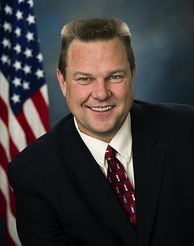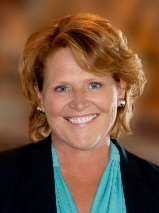Iceberg: Split-Ticket Voting Leaves GOPers Cold in Two Northern US Senate Races
North Dakota’s Rick Berg and Montana’s Denny Rehberg were the latest Republican victims of a rich history of split-ticket voting in their respective states

Smart Politics explained back in 2011 how Tester could survive despite the state voting Republican for president and, unlike Larry Sabato and Nate Silver, projected his victory due to a strong Libertarian candidacy by Dan Cox and another historical advantage in the Democrat’s corner.
That advantage also benefited Democrat Heidi Heitkamp in North Dakota against another berg from the U.S. House – one term GOPer Rick Berg.
A Smart Politics analysis of 862 U.S. Senate contests during presidential election cycles over the last century finds that only two states – Montana and North Dakota – have voted to split their presidential/U.S. Senate ballots more than half of the time.
Montana has done so in 10 of 18 cycles, or 55.6 percent of the time, with all 10 of these finding the state – as it did in 2012 – voting for the Republican presidential nominee and a Democratic Senator.
The state has now done so in eight of the last 11 cycles in which both federal offices have been on the ballot: 1952 (Mike Mansfield), 1960 (Lee Metcalf), 1972 (Metcalf), 1976 (John Melcher), 1984 (Max Baucus), 1996 (Baucus), 2008 (Baucus), and 2012 (Tester).
Montana voters also split their ticket in this fashion in 1924 (Thomas Walsh) and 1928 (Burton Wheeler).

That includes seven occasions in which North Dakotans have voted for a Republican presidential nominee and a Democratic U.S. Senate candidate: 1944 (John Moses), 1976 (Quentin Burdick), 1988 (Burdick), 1992 (Byron Dorgan), 2000 (Kent Conrad), 2004 (Dorgan), and 2012 (Heitkamp).
Rounding out the Top 10 states most likely to split their tickets are Oregon at #3 (47.4 percent), Rhode Island and Louisiana at #4 (47.1 percent), Missouri at #6 (44.4 percent), Arkansas and New Hampshire at #7 (43.8 percent), Minnesota at #9 (42.1 percent), and Delaware and Pennsylvania at #10 (41.2 percent).
Overall, the rate of split-ticket voting in presidential and U.S. Senate races is 29.3 percent, with 253 instances out of 863 contests since the first popular vote elections for the nation’s upper legislative chamber a century ago.
Missouri – the #6 “split-ticket” state mentioned above – did so again in 2012.
Although due in part to unusual circumstances with controversial statements made by GOP nominee Todd Akin, the Show Me State reelected one-term Democratic U.S. Senator Claire McCaskill by 15.5 points with Romney taking the state by 9.6 points.
Missouri has split its ticket for these two offices in eight out of 18 cycles (44.4 percent), including five times with a GOP presidential nominee and Democratic U.S. Senator (1952, 1968, 1980, 2000, 2012).
After Montana (10), North Dakota (7), and Nevada (6), Missouri is tied for fourth with Arkansas, Louisiana, South Dakota, Tennessee, and West Virginia with five split-tickets in this GOP-DEM manner at the top of the ticket.
Only one state, Kansas, has never simultaneously voted for a Republican president and a Democratic U.S. Senator across the 50 states.
By contrast, 18 states have never split their tickets by voting for a Democratic presidential nominee and a GOP U.S. Senator: Alabama, Alaska, Arizona, Connecticut, Florida, Indiana, Louisiana, Michigan, Mississippi, Montana, North Carolina, South Carolina, Texas, Utah, Virginia, West Virginia, Wisconsin, and Wyoming.
Nevada did so for the first time in 2012 voting for Obama and Republican U.S. Senator Dean Heller.
The five lowest ranking states on the split-ticket voting scale are Wisconsin at #46 (11.8 percent, 2 of 17 cycles), North Carolina at #47 (6.3 percent, 1 of 16), Utah at #48 (5.9 percent, 1 of 17), and Kansas and Wyoming tied for #49 (5.6 percent, 1 of 18 each).
In 2012, Wisconsin voted Democratic for both of these offices while Utah and Wyoming voted Republican.
After seeing Richard Mourdock’s candidacy implode in the final few weeks of the campaign, Indiana (#45, 15.8 percent), split its ticket for just the third time in history, voting in Democrat Joe Donnelly for U.S. Senate and supporting Romney for president.
Split-Ticket Voting in Presidential and U.S. Senate Races by State, 1908-2012
|
Rank
|
State
|
Split
|
Total
|
% Split
|
|
1
|
Montana
|
10
|
18
|
55.6
|
|
2
|
North Dakota
|
9
|
17
|
52.9
|
|
3
|
Oregon
|
9
|
19
|
47.4
|
|
4
|
Louisiana
|
8
|
17
|
47.1
|
|
4
|
Rhode Island
|
8
|
17
|
47.1
|
|
6
|
Missouri
|
8
|
18
|
44.4
|
|
7
|
New Hampshire
|
7
|
16
|
43.8
|
|
7
|
Arkansas
|
7
|
16
|
43.8
|
|
9
|
Minnesota
|
8
|
19
|
42.1
|
|
10
|
Pennsylvania
|
7
|
17
|
41.2
|
|
10
|
Delaware
|
7
|
17
|
41.2
|
|
12
|
Massachusetts
|
7
|
18
|
38.9
|
|
12
|
Maine
|
7
|
18
|
38.9
|
|
12
|
Georgia
|
7
|
18
|
38.9
|
|
15
|
South Dakota
|
6
|
16
|
37.5
|
|
16
|
New Jersey
|
7
|
19
|
36.8
|
|
16
|
Nevada
|
7
|
19
|
36.8
|
|
18
|
Washington
|
6
|
17
|
35.3
|
|
19
|
Tennessee
|
6
|
18
|
33.3
|
|
19
|
Alaska
|
3
|
9
|
33.3
|
|
19
|
Nebraska
|
6
|
18
|
33.3
|
|
22
|
Alabama
|
5
|
16
|
31.3
|
|
23
|
New York
|
5
|
17
|
29.4
|
|
23
|
Virginia
|
5
|
17
|
29.4
|
|
25
|
California
|
5
|
18
|
27.8
|
|
25
|
Colorado
|
5
|
18
|
27.8
|
|
25
|
West Virginia
|
5
|
18
|
27.8
|
|
28
|
Florida
|
5
|
19
|
26.3
|
|
28
|
Kentucky
|
5
|
19
|
26.3
|
|
30
|
Iowa |
4
|
16
|
25.0
|
|
31
|
Maryland
|
4
|
17
|
23.5
|
|
31
|
South Carolina
|
4
|
17
|
23.5
|
|
33
|
Mississippi
|
4
|
18
|
22.2
|
|
33
|
Idaho
|
4
|
18
|
22.2
|
|
33
|
Ohio
|
4
|
18
|
22.2
|
|
33
|
New Mexico |
4
|
18
|
22.2
|
|
33
|
Hawaii |
2
|
9
|
22.2
|
| 33 | Vermont |
4
|
18
|
22.2
|
|
33
|
Arizona |
4
|
18
|
22.2
|
|
40
|
Oklahoma
|
4
|
19
|
21.1
|
|
41
|
Connecticut
|
3
|
17
|
17.6
|
|
41
|
Michigan
|
3
|
17
|
17.6
|
|
41
|
Texas
|
3
|
17
|
17.6
|
|
44
|
Illinois
|
3
|
18
|
16.7
|
|
45
|
Indiana
|
3
|
19
|
15.8
|
|
46
|
Wisconsin
|
2
|
17
|
11.8
|
|
47
|
North Carolina
|
1
|
16
|
6.3
|
|
48
|
Utah
|
1
|
17
|
5.9
|
|
49
|
Kansas
|
1
|
18
|
5.6
|
|
49
|
Wyoming
|
1
|
18
|
5.6
|
Data compiled by Smart Politics.
Follow Smart Politics on Twitter.
